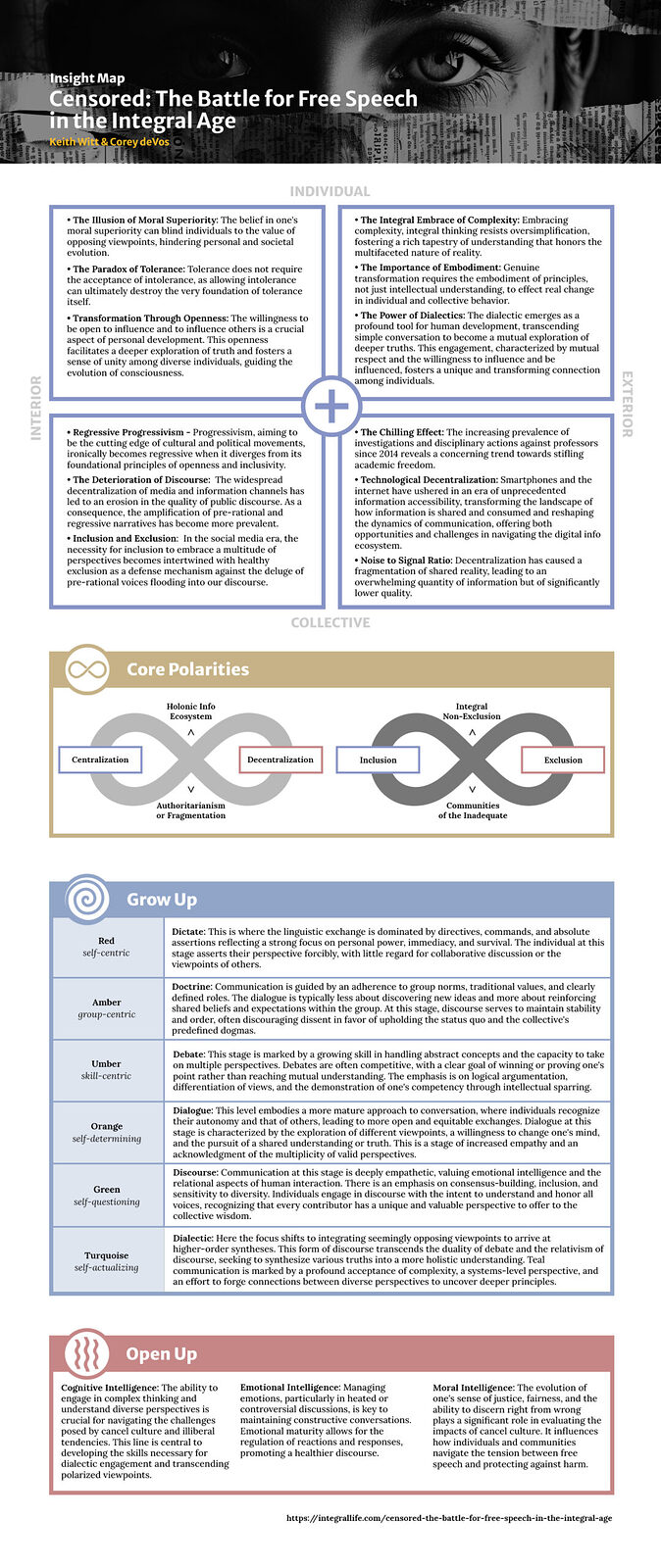Keith Witt and Corey DeVos delve into the complex and contentious issue of cancel culture, examining its implications for free speech, academic freedom, and social cohesion. They explore why understanding the nuances of cancel culture is crucial in today’s polarized environment, and how an Integral perspective can provide a more comprehensive view that embraces complexity, encourages growth, and seeks balance. This approach helps make sense of the divisive issues surrounding cancel culture by considering multiple dimensions of human experience and societal structures, aiming to find a path toward more inclusive and constructive discourse.
Dr. Keith brings to the conversation a deep analysis of the psychological and cultural dynamics at play within cancel culture, emphasizing the importance of embracing dialectic engagement — a method of conversation that seeks to integrate opposing views — to foster our personal and collective evolution. He also highlights the ways in which educational and professional institutions have become battlegrounds for ideological conflict, the detrimental effects of cancel culture on academic freedom, and the necessity for individuals to embody their most deeply-held principles courageously.
Meanwhile, Corey focuses on some of the core polarities at play in our cultural regression toward illiberalism, noting how the decentralization of information in the social media era inevitably fragments our sense of shared reality and amplifies perspectives that are as divisive as they are diverse. He describes how the democratization of information results in an overall diminishment of our collective discourse, allowing pre-rational views and narratives to flood into our informational terrains. This in turn provokes something like a collective defense mechanism from the rest of society, as our shared standards of inclusion and exclusion recalibrate to these new realities, often resulting in an unfortunate overcorrection toward censorship and other illiberal solutions.
This episode offers a rich and nuanced exploration of cancel culture through the lens of Integral Theory. Keith and Corey’s insights illuminate the complex interplay between individual beliefs, cultural dynamics, and systemic structures, underscoring the importance of fostering open dialogue, critical thinking, and empathy to navigate the challenges of the postmodern media era we find ourselves in.
Key Questions:
Here are some questions you can contemplate while listening to this discussion. We suggest you take some time to use these as journaling prompts.- Self-Reflection on Cancel Culture: How have I contributed to or been affected by cancel culture, and what steps can I take to foster a more inclusive and open-minded approach in my interactions?
- Navigating the Paradox of Tolerance: How do I personally resolve the paradox of tolerance, especially in situations where I encounter intolerance?
- Disarming the Weaponization of Tolerance: How can I better discern when tolerance is being weaponized in discussions I'm part of — either through falsely accusing perspectives of being intolerant to silence or discredit them, or by demanding that intolerant viewpoints be tolerated under the guise of promoting free speech — ensuring I contribute to a balanced and principled discourse?
- Practicing Dialectic Engagement: What practical steps can I take to engage more dialectically in conversations, aiming to understand and integrate opposing viewpoints?
- Confronting Personal Biases: What specific personal biases might be influencing my stance on cancel culture, and how can I work on acknowledging and addressing these biases?
- Evaluating DEI Initiatives: How can I contribute to the effectiveness of DEI initiatives in my organization or community, ensuring they foster true inclusivity without stifling diversity of thought?
- Exploring Controversial Ideas: How comfortable do I feel exploring and discussing controversial ideas, and what barriers do I face in doing so? Reflect on steps to overcome these barriers.
